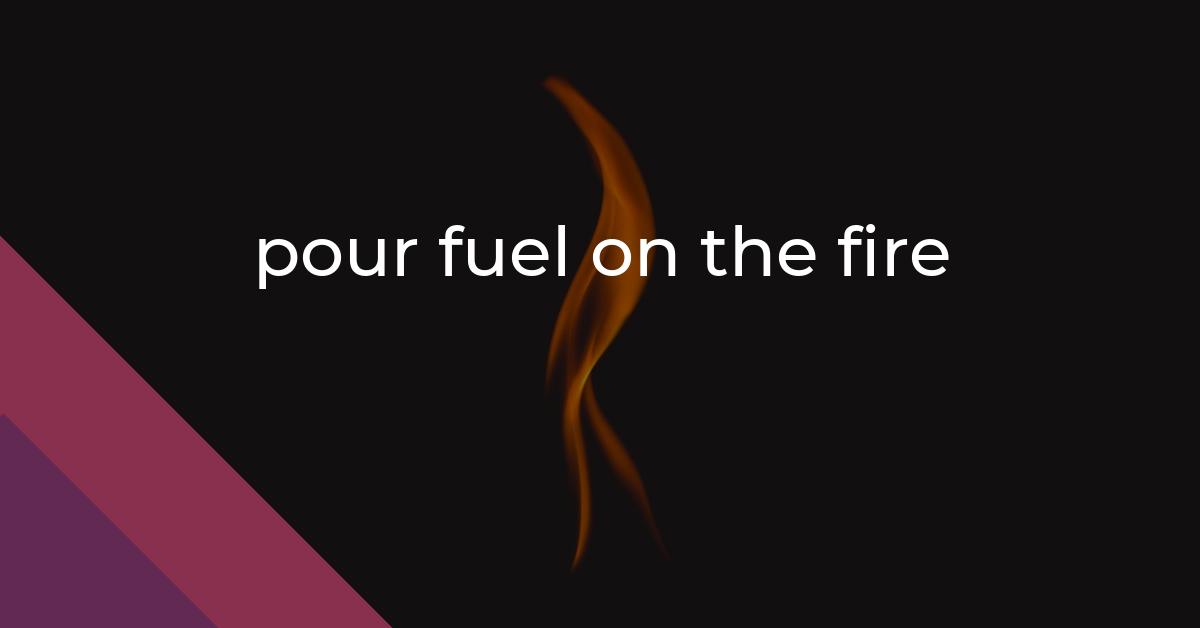pour fuel on the fire: Idiom Meaning and Origin
What does ‘pour fuel on the fire’ mean?
The idiom "pour fuel on the fire" means to worsen a situation or make a problem even more intense or volatile by saying or doing something that aggravates it further.

Idiom Explorer
The idiom "stir shit" means to purposely create trouble or provoke conflict by saying or doing something provocative or controversial.
The idiom "salt in the wound" means to worsen an already difficult or painful situation, often by adding insult to injury.
The idiom "run on fumes" means to continue doing something or functioning even though one has little energy, resources, or fuel left.
The idiom "rub salt in the wound" means to worsen a difficult situation by adding insult or further distress to someone who is already suffering or upset.
The idiom "push water uphill" means attempting to do something that is extremely difficult or impossible to achieve. It implies a futile or pointless effort that goes against the natural flow or logic of a situation.
The idiom "pour oil on troubled waters" means to do or say something to calm a difficult or tense situation.
The idiom "pour gasoline on the fire" means to aggravate or worsen a situation by adding more conflict or controversy.
The idiom "pour down the drain" means to waste or lose something valuable, especially time, effort, or resources, without any benefit or use. It conveys the idea of something being futile or ineffectual, as if it is being poured, or thrown away, down a drain with no possibility of retrieval.
The idiom "pour cold water on" means to discourage or dampen enthusiasm for an idea, plan, or suggestion by expressing disapproval or skepticism.
The idiom "play with fire" means to engage in a dangerous or risky activity, often knowing the potential consequences but still proceeding anyway.
Hidden Chaos
The idiom "pour fuel on the fire" is a commonly used expression in the English language. Its meaning is derived from its literal interpretation of exacerbating a situation or conflict by adding more fuel to it. This idiom is similar to other related idioms such as "pour gasoline on the fire," "add fuel to the fire," "feed the fire," and "pour oil on troubled waters."
The phrase originates from the concept of fire dynamics. When you pour fuel or gasoline on a fire, it grows in size and intensity. Similarly, when you add fuel to a fire, it becomes more powerful and potentially spreads out of control. These actions metaphorically represent the act of intensifying an already volatile situation.
The idiom "pour fuel on the fire" gained popularity due to its vivid imagery and relatability to everyday experiences. It quickly became a staple in the English language, often used to describe situations when someone's actions or words exacerbate an already challenging situation. The idiom "pour gasoline on the fire" and "add fuel to the fire" can be used interchangeably with "pour fuel on the fire" to convey the same meaning.
In interpersonal relationships, the idiom is frequently used to describe situations where one person's remarks or behavior worsen an already tense situation. For example, imagine two friends having a disagreement. If one friend continually makes snide remarks and refuses to listen, they are effectively "pouring fuel on the fire." This phrase emphasizes the potential for rapid escalation and increasing difficulties in such conflicts.
In the realm of politics, the idiom is often used to describe actions or statements that exacerbate existing tensions or conflicts. Politicians who engage in divisive rhetoric or take actions that further polarize the public are said to be "pouring fuel on the fire." Their actions intensify the already heated discussion or debate, making compromise or resolution more challenging.
The idiom is also applicable to social debates and controversies. When discussing highly sensitive topics, individuals who make inflammatory remarks or engage in confrontational behavior are figuratively "pouring fuel on the fire." These actions exacerbate tensions and hinder progress towards understanding and resolution.
Furthermore, the idiom "pour fuel on the fire" is not limited to one particular region or culture. It has transcended linguistic and cultural barriers, becoming a universal expression used in both formal and informal discourse. Its simplicity and effectiveness in conveying its intended meaning have contributed to its enduring popularity.
The phrase "feed the fire" is closely related to "pour fuel on the fire." It carries a similar meaning of exacerbating a situation by adding more fuel to it. Just as pouring fuel onto a fire intensifies it, feeding a fire with additional fuel sustains its momentum and power. In the context of a conflict or disagreement, "feeding the fire" means contributing to its continuation and escalation.
The idiom "pour oil on troubled waters" is another related expression. It conveys the opposite action of "pouring fuel on the fire." To pour oil on troubled waters means to calm down or pacify a tense or volatile situation. Just as oil smooths out the surface of water, this idiom suggests the idea of easing tensions or conflicts.
Interestingly, the idiom "pour fuel on the fire" also opens up possibilities for alternative interpretations and creative usage. While primarily used to describe negative situations, it can be employed in a more positive light to suggest the idea of adding energy or enthusiasm to a situation or endeavor. This flexible usage demonstrates the versatility of idiomatic expressions and the potential for multiple layers of meaning.
Overall, the idiom "pour fuel on the fire" encapsulates the notion of worsening an already problematic situation through thoughtless actions or words. Its vivid imagery and universal applicability have established it as a common expression in the English language. The related idioms "pour gasoline on the fire," "add fuel to the fire," "feed the fire," and "pour oil on troubled waters" convey similar meanings and can be used interchangeably. As with any idiom, its strength lies in its ability to convey a complex idea concisely and effectively, leaving room for interpretation and further exploration.
Example usage
Examples of how the idiom "pour fuel on the fire" can be used in a sentence:
- She tried to calm the situation, but her offensive comment only poured fuel on the fire.
- His decision to quit his job during a team crisis only poured fuel on the fire, causing even more chaos.
- The media's biased reporting during the scandal served to pour fuel on the fire of public outrage.
More "Conflict" idioms



